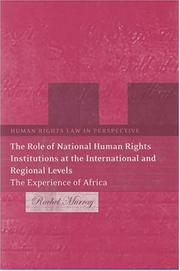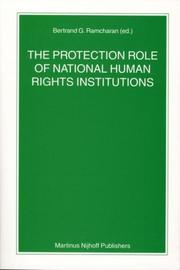| Listing 1 - 10 of 80 | << page >> |
Sort by
|

ISBN: 9211541158 Year: 1995 Publisher: New York (N.Y.) United Nations
Abstract | Keywords | Export | Availability | Bookmark
 Loading...
Loading...Choose an application
- Reference Manager
- EndNote
- RefWorks (Direct export to RefWorks)
Book
ISBN: 1472563956 1281165646 9786611165642 1847313647 9781472563958 9781281165640 9781847313645 Year: 2007 Publisher: Oxford ; Portland, Oregon : Hart Publishing,
Abstract | Keywords | Export | Availability | Bookmark
 Loading...
Loading...Choose an application
- Reference Manager
- EndNote
- RefWorks (Direct export to RefWorks)
"National Human Rights Institutions (NHRIs), defined by the UN as bodies established to promote and protect human rights, have increased in number since the General Assembly adopted principles governing their effectiveness in 1993. The UN and others have encouraged states to set up such institutions as an indication of their commitment to human rights, and now over 20 such institutions exist in Africa and many more will follow. These institutions have taken various forms including ombudsmen, commissions, or a combination of the two. They differ in terms of how they are established; some by constitution, some by legislation and some by decree. These NHRIs have varying functions, usually both promotional and protective, such as giving advice to government, parliament, and others, making recommendations on compliance with human rights standards, awareness raising, and analysis of law and policy. Despite the considerable variations in the method of their creation, powers and composition, most of these institutions have chosen or indeed been mandated, to become involved in international and regional fora. This book examines these institutions in the African region, the way in which they use the international and regional fora, the effectiveness of their contributions and how they are able to participate."--Bloomsbury Publishing.
Book
ISBN: 9789004530225 9789004157156 Year: 2006 Publisher: Leiden ;Boston Brill | Nijhoff
Abstract | Keywords | Export | Availability | Bookmark
 Loading...
Loading...Choose an application
- Reference Manager
- EndNote
- RefWorks (Direct export to RefWorks)
The 'Yearbook on Human Rights' provides a comprehensive overview of the activities and jurisprudence of the Inter-American Commission on Human Rights and the Court of Human Rights for the year 2002. It includes detailed reports on key human rights cases across various countries in the Americas, such as Brazil, the United States, and Guatemala. The yearbook aims to document the legal foundations and decisions made by these bodies, offering valuable insights for legal professionals, scholars, and policymakers interested in human rights law and its application in the Americas. This annual publication serves as a resource for understanding the evolving landscape of human rights issues and the judicial responses to them.
Human rights. --- National human rights institutions. --- Human rights --- National human rights institutions
Book
ISBN: 9210556631 Year: 2010 Publisher: [Place of publication not identified] United Nations
Abstract | Keywords | Export | Availability | Bookmark
 Loading...
Loading...Choose an application
- Reference Manager
- EndNote
- RefWorks (Direct export to RefWorks)
National human rights institutions --- Human rights --- National human rights institutions. --- Human rights.

ISBN: 9781841133942 Year: 2007 Publisher: Oxford Hart
Abstract | Keywords | Export | Availability | Bookmark
 Loading...
Loading...Choose an application
- Reference Manager
- EndNote
- RefWorks (Direct export to RefWorks)
National human rights institutions.. --- National human rights institutions --- Human rights --- National institutions for the promotion and protection of human rights --- NHRIs (National human rights institutions) --- Administrative agencies --- Human rights advocacy --- National human rights institutions.
Book
ISBN: 9004636498 9789004636491 9789041102911 Year: 1997 Publisher: Leiden ;Boston Brill | Nijhoff
Abstract | Keywords | Export | Availability | Bookmark
 Loading...
Loading...Choose an application
- Reference Manager
- EndNote
- RefWorks (Direct export to RefWorks)
This book provides an in-depth analysis of the African Charter on Human and Peoples' Rights, a significant legal instrument in the field of human rights in Africa. Authored by U. Oji Umozurike, the text examines the historical context, civil, political, economic, social, and cultural rights enshrined in the Charter. It discusses the role and challenges faced by the African Commission on Human and Peoples' Rights in implementing these rights. The book also compares the African Charter with other major human rights instruments and explores the prospects for human rights in Africa. Designed for legal scholars, human rights practitioners, and students, the work aims to aid future research and provide insights into the ongoing development of human rights law in Africa.

ISBN: 9004145265 9047415116 9789004145269 9789047415114 Year: 2005 Publisher: Leiden;Boston Brill | Nijhoff
Abstract | Keywords | Export | Availability | Bookmark
 Loading...
Loading...Choose an application
- Reference Manager
- EndNote
- RefWorks (Direct export to RefWorks)
One of the more promising developments in global efforts to uphold human rights over the past decade has been the growing role of national human rights institutions. A role for national institutions was foreseen by the United Nations Economic and Social Council as early as 1946 and since the adoption of the Universal Declaration of Human Rights in 1948 the Commission on Human Rights and the United Nations Secretariat have sought to promote the role of such institutions. This volume offers a wealth of information on the protection functions of existing national human rights institutions in a wide selection of countries, drawn from Asia, Africa, Europe, Latin America and Oceania. These essays together make clear the genuine striving by national human rights commissions to act for the protection of human rights in the countries they serve, and the variety of protection models that can and are being adopted, both in developed and developing countries.
Human Rights. --- Human rights movements. --- Developed nations --- Human rights --- National authorities --- National human rights institutions
Book
ISBN: 9780198822844 0198822847 Year: 2018 Publisher: Oxford: New York: Oxford university press,
Abstract | Keywords | Export | Availability | Bookmark
 Loading...
Loading...Choose an application
- Reference Manager
- EndNote
- RefWorks (Direct export to RefWorks)
Human Rights. --- Human rights --- National human rights institutions. --- Human rights monitoring.
Book
ISBN: 9811630933 9811630925 Year: 2021 Publisher: Singapore : Palgrave Macmillan,
Abstract | Keywords | Export | Availability | Bookmark
 Loading...
Loading...Choose an application
- Reference Manager
- EndNote
- RefWorks (Direct export to RefWorks)
Human rights advocacy --- Civil society --- Advocacy, Human rights --- Social advocacy --- National human rights institutions --- ASEAN. --- Association of Southeast Asian nations
Book
ISBN: 9783030998158 Year: 2022 Publisher: Cham Springer International Publishing :Imprint: Palgrave Macmillan
Abstract | Keywords | Export | Availability | Bookmark
 Loading...
Loading...Choose an application
- Reference Manager
- EndNote
- RefWorks (Direct export to RefWorks)
Human rights advocacy. --- Political corruption --- United States --- Foreign relations. --- Advocacy, Human rights --- Social advocacy --- National human rights institutions
| Listing 1 - 10 of 80 | << page >> |
Sort by
|

 Search
Search Feedback
Feedback About UniCat
About UniCat  Help
Help News
News